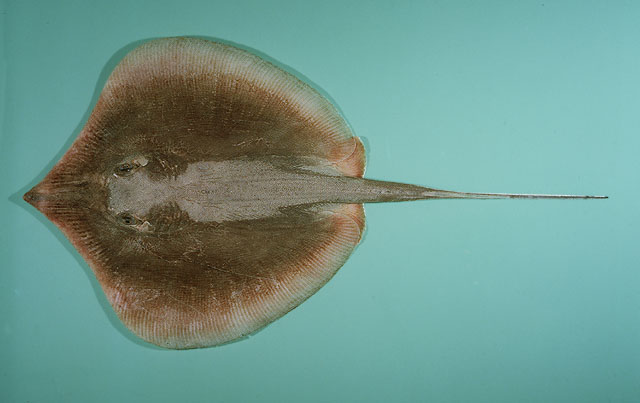| Dasyatidae (Stingrays), subfamily: Urogymninae |
| 25.5 cm WD (male/unsexed); 31 cm WD (female); max.weight: 590.0 g; max.weight: 1,050.0 g |
|
demersal; freshwater; brackish; marine; depth range 1 - 45 m, amphidromous |
| Indian Ocean: India, Sri Lanka (Arabian Sea, Laccadive Sea and Bay of Bengal) and nw Indonesia (off Singapore); questionable in Myanmar and Taiwan. |
|
Disc width equal to disc length; tail shorter than body; ventral surface of disc entirely white (Ref. 12693). |
| Found in inshore coastal waters (Ref. 30573). Typically found in estuarine habitats, but also reported from the Great Lake. The single record from the Great Lake may in fact refer to Dasyatis laosensis. Young and adults feed on benthic invertebrates (Ref. 12693). Ovoviviparous (Ref. 124). Feeds on bottom-living invertebrates (Ref. 68964). May grow to a maximum of 140 cm disc length in the sea (Ref. 43081). Juveniles may be present in mangroves (Ref. 43081). Examined adult males 17.1 cm DW (32.0 cm TL) - 20.5 cm DW (39.8 cm TL); females 13.8 cm DW (25.6 cm TL) - 20.4 cm DW (39.6 cm TL); early juveniles (USNM 222564, immature male 12.0 cm DW and female 8.8 cm DW) have lost umbilical scars. Reported maximum disc width 30.0 cm (Ref. 11312) was found excessive (Ref. 130662). |
|
Vulnerable (VU); Date assessed: 30 April 2020 (A2d) Ref. (130435)
|
| venomous |
Source and more info: www.fishbase.org. For personal, classroom, and other internal use only. Not for publication.
